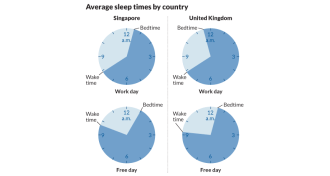Notebook
-
 Psychology
PsychologyVocal fry
At the lowest registers of the human voice, a creaky, popping sound known as vocal fry emerges.
-
 Psychology
PsychologyWesterners sleep more than people from Eastern nations
Sleep schedules vary from country to country, with social demands like work and study providing the primary incentives to stay up.
-
 Animals
AnimalsAnt lions hunt despite sealed lips
Ant lions are ferocious predators, but some of them don’t have a mouth. At least not in the usual sense.
By Susan Milius -
 Astronomy
AstronomyStar-eating star spotted
The first Thorne-Żytkow Object, a strange pair of stars where one engulfs the other, has been discovered.
-
 Science & Society
Science & SocietyScientists have long had one of the most admired careers
Excerpt from the July 11, 1964, issue of Science News Letter.
-
 Health & Medicine
Health & MedicineObesity on the rise globally
Some 2.1 billion people, almost 30 percent of the world’s population, are overweight or obese.
-
 Life
LifeCalifornia mite becomes fastest land animal
Despite being the size of a sesame seed, the Paratarsotomus macropalpis mite can outpace Usain Bolt and even a cheetah in terms of body lengths per second.
-
 Tech
TechSelf-driving cars are not a thing of the past
Engineers have not given up on self-driving cars. The focus has shifted from a mechanical approach to using batteries and GPS.
-
 Animals
AnimalsLook beyond pest species to find beauty in cockroaches
A few pest species give the group a bad name, but exotic roaches include an amazing diversity of colors and lifestyles.
By Susan Milius -

-

-
 Astronomy
AstronomyYoung, hot exoplanet takes title for longest year
Newly discovered exoplanet sits a whopping 2,000 times farther from its star than Earth does from the sun.